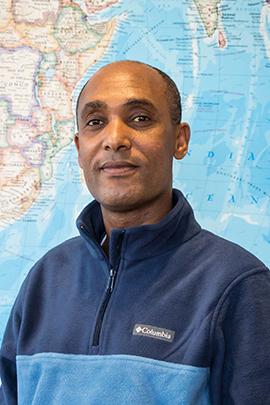Visiting Professor Kemisso Explores Education Equality for Refugees

“Education is not only a right, but it’s also an enabling right,” said Dr. Alebachew Kemisso, a visiting professor at Arcadia and director of the Centre for Comparative Education and Policy Studies at Addis Ababa University in Ethiopia. “For refugees, if we keep them out of education, we are denying their rights. We are denying them from exercising all of their rights, such as their right to expression and their right to vote.”
Arcadia University is hosting Dr. Kemisso through the spring semester so he can research refugee education as a Civil Society Scholar award recipient. In collaboration with Dr. Jennifer Riggan, professor of Historical and Political Studies, Dr. Kemisso’s research project, “Integration of Refugees into National Education Systems in Ethiopia,” will explore what an integrated education system for refugees and host communities would look like and the challenges that need to be addressed before it can happen.
Dr. Kemisso noted that recent statistics from the United Nations High Commissioner for Refugees (UNHCR) show approximately 730,000 refugees in Ethiopia—making it the second-largest refugee host country in Africa. He pointed out that the issue of integrated education is complicated because of the varying availability of local education and resources. There’s a history within Ethiopia where refugees will attend community schools if a parallel education system is not available in the refugee camp, and alternately, local students will go to a refugee camp school if a community one is not available. However, the government of Ethiopia wants to bring refugees into the national system, which would eliminate parallel education systems. In the capital city of Addis Ababa an integrated system exists for both refugees and locals, but, Dr. Kemisso noted, in some regions where severe poverty exists the local disparity in economic levels between the poor community and the refugees who receive assistance could lead to more conflict where resources are limited.
“Discussions and buy-in from the local governments are very low,” said Dr. Kemisso. “Ethiopia is quite a multi-ethnic nation, and ethnic relationships are critical to understand while planning these types of important policies.”
Dr. Kemisso and Dr. Riggan connected in Ethiopia, while Dr. Riggan was at Addis Ababa University in 2016-17 for her Teaching/Research Fulbright award. While in Ethiopia, she studied how civic education has been implemented in Ethiopian secondary schools and refugee education among Eritrean refugees.
“We collaborated on a research project on urban refugees when I was in Ethiopia, and in general, we share resources and expertise,” said Dr. Riggan. “We have some comparative work to do—I work almost exclusively with one particular refugee population in Ethiopia, while Dr. Alebachew has a lot of knowledge about all of the country’s refugee populations. One thing we want to think about together are the regional differences in hosting refugees.”
During his stay in the United States until May 15, Dr. Kemisso is hoping to build relationships with American experts in the field of refugee studies, including researchers at Harvard University and the University of Wisconsin. He won’t be teaching at Arcadia, but he will be working with the Historical and Political Studies Department to expand his research network and share his expertise with students.
Dr. Kemisso, Dr. Riggan, and Dr. Amanda Poole, associate professor of Anthropology at Indiana University of Pennsylvania, will present a roundtable discussion entitled: “Why does refugee education in Ethiopia matter? The view of global migration from the South.” This is the final event in the Steinbrucker Lecture Series, sponsored by Dr. Hilary Parsons Dick, associate professor of International Studies and recipient of the Frank and Evelyn Steinbrucker ’42 Endowed Chair (2019-2021). The roundtable will be held in the Commons meeting rooms 1-3 on Monday, April 6, at 4:30 p.m.


